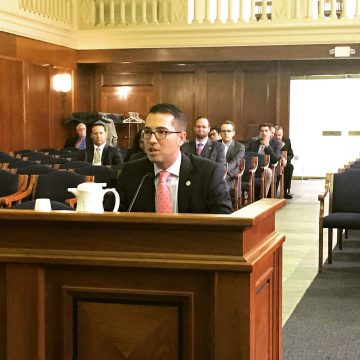
State Rep. Brandt Iden submitted an online gambling bill to the Michigan House of Representatives, so Michigan could pass an iGaming law in the coming months. On Wednesday morning, the Michigan House Regulatory Reform Committee plans to hold a hearing about online gambling.
An online gambling bill might be complicated by the 13 tribal casinos in Michigan, but any bill would give the tribes the right to launch their own gaming portals. Also, MGM Resorts International — a supporter of online gambling in New Jersey — owns the MGM Detroit.
Since Las Vegas Sands Corporation, which opposes online gambling, does not own a Michigan casino, the lobbying effort for the pro-online gaming side might be a bit simpler than it otherwise might be. The past few years have proven that no online gambling legislative movement can be taken for granted.
John Pappas to Testify at Michigan iGaming Hearing
John Pappas, the President of the Poker Players Alliance (PPA), will testify at the Wednesday hearing. The PPA is the leading advocacy group for online poker in the United States.
Pappas announced on Twitter he would be making an appearance at the hearings.
New #iGaming bill will be intro’d in the Michigan House of Reps tmrw. A hearing on the bill will happen the very next day. I’ll testify. -JP
— PokerPlayersAlliance (@ppapoker) September 11, 2017
John Pappas provides an authoritative voice for the pro-gaming side at state and federal hearings on poker — and online poker in general. Pappas has testified at enough hearings that he has heard all of the arguments against online gambling and has reasoned counter-arguments for them. It is a good sign for proponents of Michigan online gambling that the PPA’s director will be present.
Mike Kowall’s Michigan Online Gambling Bill
State Sen. Mike Kowall introduced online gambling legislation earlier this year, but Iden’s proposed bill differs in a couple of key areas. Those changes might make the Iden proposals more palatable to the gaming interests in the state.
Kowall’s bill said that land-based tribal gaming authorities had to “waived its sovereign immunity” as it applied to Internet gambling in order to launch online casinos and poker sites. H 4926 requires tribes to renegotiate their gaming compact.
That might sound like a needlessly complicated process for the tribes, but altering the gaming compact presumably would allow the tribe to keep from waiving its sovereign status.
H 4926: Iden’s Online Gambling Bill
House Bill 4926 states that “a federally recognized Michigan Indian tribe may conduct Internet gambling, if authorized by a compact the tribe has entered into with this state under the Indian Gaming Regulatory Act.”
How the tribes might react to Brandt Iden’s stipulation is unknown, but an educated guess can be made based on the Michigan tribe’s stance on a recently-proposed brick-and-mortar sports betting bill. When it was proposed that the tribes could retain their sovereignty, but would be required to renegotiate their gaming compacts with the state, the tribes suggested that commercial casino owners like MGM Detroit should have their online gambling rollout delayed by a number of years.
The delay would give the tribes the time they needed to negotiate a gaming compact, theoretically preserving a level playing field. Whether Rep. Iden’s bill addresses those arguments in any meaningful way will be addressed at Wednesday’s meeting.
Michigan Online Gambling Tax Rate
The tax rate under Brandt Iden’s bill would be 15% on all online gambling. Under Mike Kowall’s bill, the tax rate would have been 10%. In either case, the startup costs would be large for online and mobile gaming, but the overhead is much less than brick-and-mortar casinos, because its labor costs are far lower.
One stipulation in H 4926 says the state could lower the tax rate at a later time. One reason to have such a stipulation would be to allow the state to negotiate different tax rates with the tribal gaming casinos, in exchange for concessions.
The Indian Gaming Regulation Act says the state cannot charge more from the tribe than the cost of regulation and licensing itself, unless the state gives the tribe special concessions. The flexibility to make such deals would be needed, to make alteration of a tribal gaming compact feasible.
Licensing Fees for Michigan Online Gambling
Iden’s House Bill 4926 has similar language to Kowall’s Senate Bill 203 in a number of meaningful ways. The licensing fee is the same: a $100 thousand application fee and a $200,000 first-year licensing fee. After the first year of a 5-year gaming license, the operator would be required to pay $100,000 annually.
Platform providers — the software design companies which provide the technical expertise to service customers — would need to pay a $50,000 application fee and a $100,000 fee for the first year of its license. Afterwards, the licensing costs would be $50,000 a year.
Michigan vendor licenses would be much smaller. A vendor would need to pay a one-time $5,000 up-front cost for a 5-year license. After the first year, the cost for vendors would be $2,500. Vendors would not need to pay application fees.















